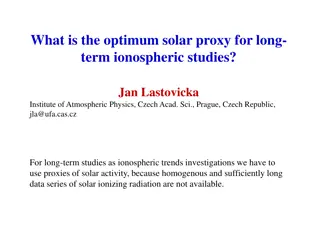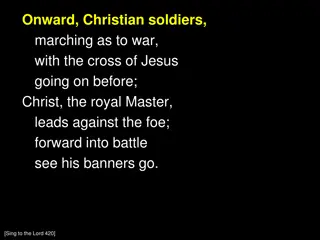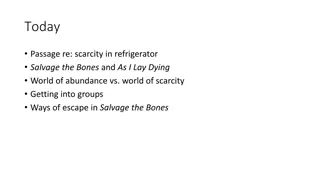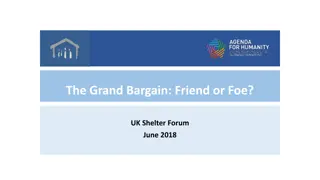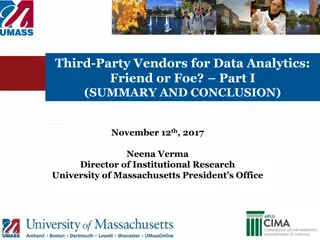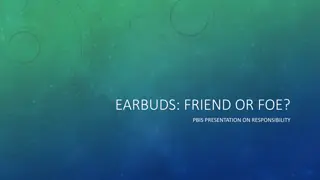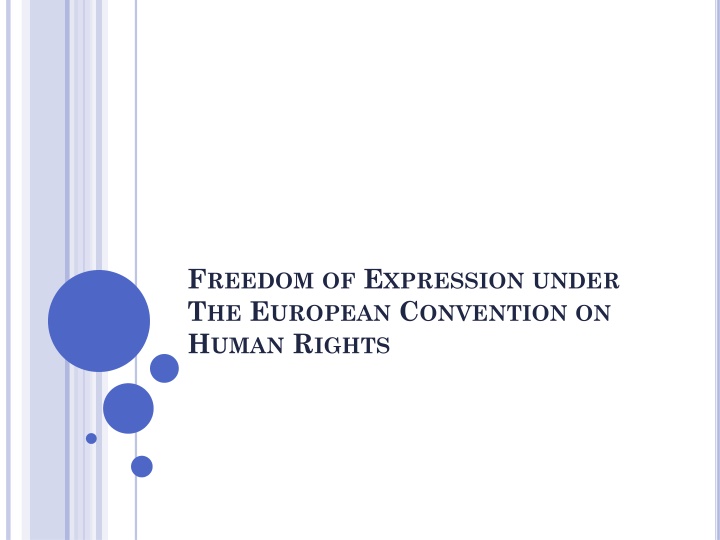
Rights of Freedom of Expression under European Convention on Human Rights
Explore the protection of freedom of expression under the European Convention on Human Rights (ECHR). Article 10 of the ECHR safeguards the rights to hold opinions, impart information, and receive ideas without interference by public authorities. Discover the essentials of Article 10, including the permissible restrictions, and learn what falls under the protection of this fundamental freedom.
Download Presentation

Please find below an Image/Link to download the presentation.
The content on the website is provided AS IS for your information and personal use only. It may not be sold, licensed, or shared on other websites without obtaining consent from the author. If you encounter any issues during the download, it is possible that the publisher has removed the file from their server.
You are allowed to download the files provided on this website for personal or commercial use, subject to the condition that they are used lawfully. All files are the property of their respective owners.
The content on the website is provided AS IS for your information and personal use only. It may not be sold, licensed, or shared on other websites without obtaining consent from the author.
E N D
Presentation Transcript
FREEDOM OF EXPRESSION UNDER THE EUROPEAN CONVENTION ON HUMAN RIGHTS
THE EUROPEAN CONVENTION ON HUMAN RIGHTS Council of Europe 47 Member States 1953 The European Convention on Human Rights (ECHR) entered into force. European Court of Human Rights (ECtHR) Individuals v. Member State Member State v. Member State Individual v. individual
FREEDOM OF EXPRESSION (ART. 10 ECHR) Freedom of expression 1. Everyone has the right to freedom of expression. This right shall include freedom to hold opinions and to receive and impart information and ideas without interference by public authority and regardless of frontiers. This Article shall not prevent States from requiring the licensing of broadcasting, television or cinema enterprises. 2. The exercise of these freedoms, since it carries with it duties and responsibilities, may be subject to such formalities, conditions, restrictions or penalties as are prescribed by law and are necessary in a democratic society, in the interests of national security, territorial integrity or public safety, for the prevention of disorder or crime, for the protection of health or morals, for the protection of the reputation or rights of others, for preventing the disclosure of information received in confidence, or for maintaining the authority and impartiality of the judiciary.
ARTICLE 10 PARAGRAPH 1 Three rights: Freedom to hold opinions. Absolute (any restriction is incompatible with the nature of a democratic society) Freedom to impart information and ideas. Freedom to receive information and ideas. To be exercised: Freely. Without interference by public authorities. Regardless of frontiers.
ARTICLE 10 PARAGRAPH 2 Freedom of expression can be subject to restriction: Prescribed by law (legality). Necessary in a democratic society (necessity). Pursuing a legitimate aim (legitimacy). National security. Territorial integrity. Public safety. Prevention of disorder or crime. Protection of health. Protection of morals. Protection of reputation and the rights of others. Preventing the disclosure of information received in confidence. Maintaining authority and impartiality of the judiciary.
WHAT IS PROTECTED UNDER ARTICLE 10? Words (written or spoken) Pictures (M ller and Others v. Switzerland 1988) Images (Chorherr v. Austria 1993) Actions (Steel and Others v. UK 1998) Cultural heritage (Khurshid Mustafa and Tarzibachi v. Sweden 2008) Intended to express an idea or to present information. Irrespectively of the form in which they are expressed (printed documents, radio broadcasts, paintings, films, poetry, novels, electronic information systems).
UNPROTECTED SPEECH Hate speech; incitement to violence.
Article 17 ECHR Article 10 Paragraph 2 2. The exercise of these freedoms, since it carries with it duties and responsibilities, may be subject to such formalities, conditions, restrictions or penalties as are prescribed by law and are necessary in a democratic society, in the interests of national security, territorial integrity or public safety, for the prevention of disorder or crime, for the protection of health or morals, for the protection of the reputation or rights of others, for preventing the disclosure of information received in confidence, or for maintaining the authority and impartiality of the judiciary. Prohibition of abuse of rights Nothing in this Convention may be interpreted as implying for any State, group or person any right to engage in any activity or perform any act aimed at the destruction of any of the rights and freedoms set forth herein or at their limitation to a greater extent than is provided for in the Convention.
INCITEMENT TO VIOLENCE Not protected by Article 10 where there is an intentional and direct use of wording to incite violence and there is a real possibility that the violence occurs. A conviction is not contrary to Article 10.
HATE SPEECH AND RACISM It is in principle necessary to sanction or even prevent all forms of expression which spread, incite, promote or justify hatred based on intolerance . (Erbakan v. Turkey 2006). Inciting to hatred does not necessarily entail a call for an act of violence, or other criminal acts. Attacks on persons committed by insulting, holding up to ridicule or slandering specific groups of the population can be sufficient (F ret v. Belgium). Any expression containing elements of racial and religious discrimination falls outside Article 10. (K hnen v. the Federal Republic of Germany 1988). Punishment of a journalist for another person s statements made in an interview hamper the contribution of the press to public debate. Allowed only if there are particularly strong reasons for doing so.
HOLOCAUST DENIAL AND NAZI IDEOLOGY Speech denying Holocaust and promoting Nazi ideology falls outside the scope of Article 10. Images referring to Holocaust in social campaigns (PETA Deutschland v. Germany 2012). Denial in public discourse (D.I. v. Germany 1996). Comedian Dieudonn M Bala M Bala. (M Bala M Bala v. French 2015). Denial of Armenian genocide was granted protection under Article 10. (Perin ek v. Switzerland v. Switzerland 2015).
HATE SPEECH AND INTERNET (INTERMEDIARY LIABILITY) Sanctions can be taken against a company running an internet news portal for user- generated comments. (Delfi AS. V. Estonia 2015). Commercial nature of the portal; nature of the comments; delay; fines.
WINER V. UK (1986) LACK OF DOMESTIC REMEDIES FOR GROSS VIOLATIONS OF PRIVACY, INCLUDING RIGHT OF REPLY. The right of reply was not addressed by the Commission. The applicant retained the liberty to publish.
EDICIONES TIEMPO SA V SPAIN (1989) COMPATIBILITY OF AN ORDER TO PUBLISH A REPLY WITH FREEDOM OF EXPRESSION. The purpose of the right of reply is to safeguard the interest of the public in receiving information from a variety of sources and thereby to guarantee the fullest possible access to information A reply, in order to be effective, must be published immediately. Therefore, the veracity of the facts asserted could not be checked in great detail at the time of publication .
MELNYCHUK V UKRAINE (2005) RIGHT OF REPLY CONCERNING A BOOK REVIEW. Right of reply falls within the scope of Article 10. Need to be able to contest untruthful information Ensure a plurality of opinions in matters of general interest. Newspapers and other privately owned media must be free to exercise editorial discretion in deciding whether to publish contents submitted by private individuals. In exceptional circumstances a newspaper may legitimately be required to publish. In some situation there can be an obligation for the State to ensure an individual s freedom of expression (defamation cases). Denial of access to the media must not be an arbitrary and disproportionate interference with an individual s freedom of expression.
VITRENKO V. UKRAINE (2008) DEFAMATORY STATEMENTS AND ORDER TO PAY FOR 50- SECOND BROADCAST TO CORRECT THE RECORD. A State has the obligation to ensure that a person subjected to defamatory have a reasonable opportunity to exercise their right to reply by submitting a response [ ] in the same manner as it was disseminated .
SALIYEV V. RUSSIA (2010) EDITORS DECISION TO WITHDRAW AN ISSUE Private newspapers are free to exercise editorial discretion in deciding whether to publish articles, comments or letters coming from private individuals. A right to access to privately owned media may be conceded in some circumstances, but they remain exceptional. The choice of the material that goes into a newspaper [ ], whether fair or unfair, constitute the exercise of editorial control and judgment . No reference to the arbitrariness test.
KAPERZYSKI V POLAND (2012) CRIMINALISING A REFUSAL TO PUBLISH A REPLY. A legal obligation to publish a rectification or a reply may be seen as a normal element of the legal framework governing the exercise of the freedom of expression by the print media. It cannot as such be regarded as excessive or unreasonable . An obligation to explain the reasons for a refusal to publish is not open to criticism . The use of criminal law is not a violation by itself. Sanctions must be proportionate and they should not have a dissuasive effect on the press .
FREEDOM OF EXPRESSION AND REPUTATION
RIGHT TO PRIVACY (ARTICLE 8 OF THE ECHR) Right to respect for private and family life 1. Everyone has the right to respect for his private and family life, his home and his correspondence. 2. There shall be no interference by a public authority with the exercise of this right except such as is in accordance with the law and is necessary in a democratic society in the interests of national security, public safety or the economic well-being of the country, for the prevention of disorder or crime, for the protection of health or morals, or for the protection of the rights and freedoms of others.
BALANCING CRITERIA (AXEL SPRINGER AG V. GERMANY 2012) Contribution to a debate of general interest. How well known the person and the subject are. Person s prior conduct. Methods used to obtain the information. Veracity, content, form and repercussions. Penalty imposed.
POLITICAL DEBATE (LINGENS V. AUSTRIA - 1986) Freedom of political debate is at the very core of the concept of a democratic society which prevails throughout the Convention. The limits of criticism regarding a politician are wider than regarding a private individual, because he is inevitably and knowingly open to close scrutiny by the media and the public. A politician must show greater tolerance. Protection of politicians reputation must be weighed in relation to the interest of open discussion of political issues. The conviction of the journalist was a sanction [ ] liable to hamper the press in performing its task as purveyor of information and public watchdog .
HIGH RANKING OFFICIALS OR CIVIL SERVANTS Any law that shields a person from criticism only in reason of their function or status cannot be reconciled with modern practice and political conception. (Colombani and others v. France - 2002). It is not always possible to distinguish between political debate and discussions on other matters of public interest. (Thorgeir Thorgeirson v. Iceland 1992). Civil servants acting in official capacity are subject to wider criticism. However, they do not knowingly lay themselves open to close scrutiny of all their words and deeds. (Thoma v. Luxembourg 2001).
NATURE OF EXPRESSION Article 10 protects also the ideas that offend, shock, disturb. (Handyside v. the United Kingdom 1976). Vulgar expressions are not decisive in evaluating the statement. (Uj v. Hungary 2011). Strong and exaggerate language is accepted when related to public interest (political debate). (Thorgeirson v. Iceland 1992). Reply to a provocation (Lopes Gomes da Silva v. Portugal - 2000).
FACTS OR OPINIONS The existence of facts can be demonstrated, while value judgments cannot be proved. (Dichand and others v. Austria 2002). A journalist cannot be debarred from expressing value judgments unless they could prove their truth. (Dalban v. Romania 1999). A factual basis must support value judgments. (Feldek v. Slovakia 2001). Good faith defense a journalist who had sufficient reasons to believe that a piece of information was true at press time cannot be punished for defamation. (Sunday Times II v. United Kingdom). Delay of publication would deprive information of its value and interest. Diligence and professionalism (reliable sources) Stronger for criminal law provisions. Lack of interest in defaming.
SANCTIONS Criminal sanctions (in particular imprisonment) are able to hamper the press role of public watchdog. Only in exceptional circumstances where other fundamental rights have been seriously impaired (hate speech, incitement to violence). (Mahmudov and Agazade v. Azerbaijan - 2008). The mere existence of sanctions can lead to a chilling effect, irrespectively of their application. (Lewandowska-Malec v. Poland 2012) A civil compensation cannot be of a punishing nature. (Tolstoy Miloslavsky v. the United Kingdom 1995).

